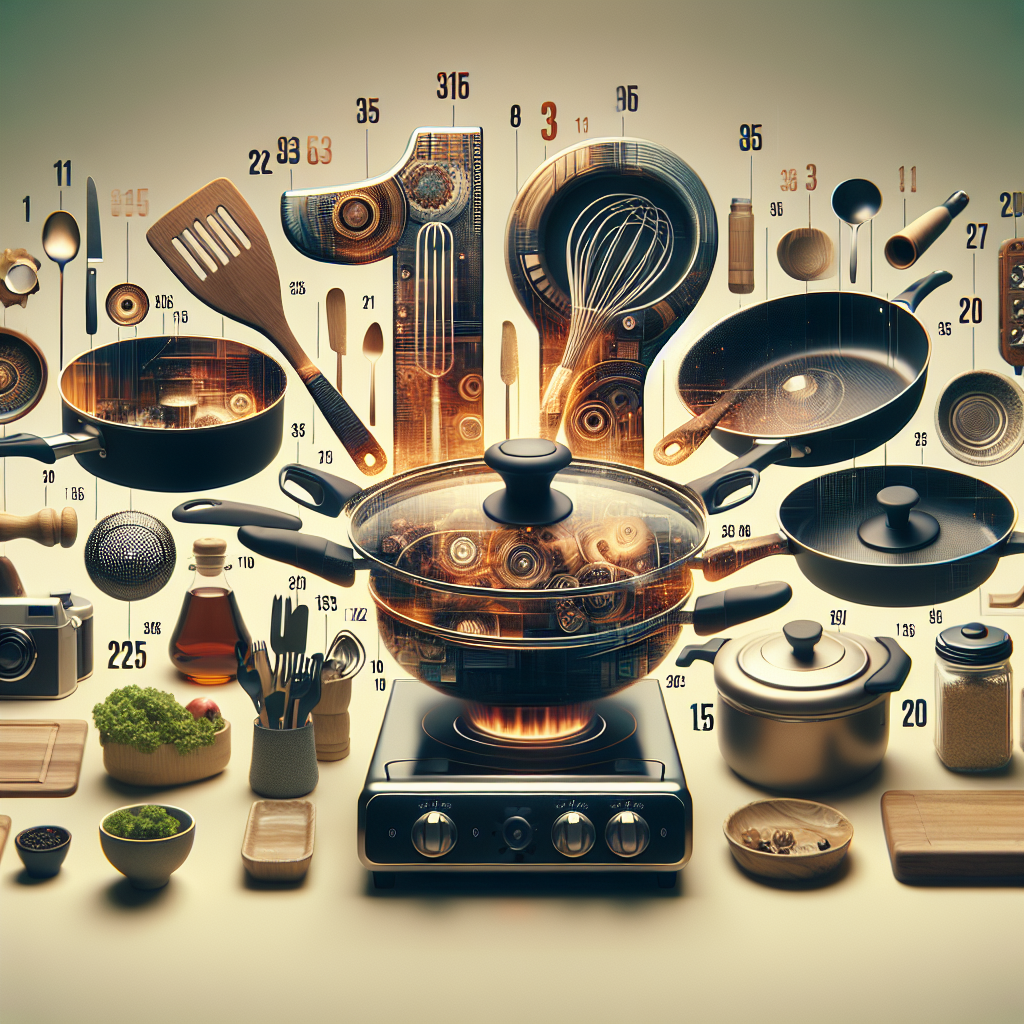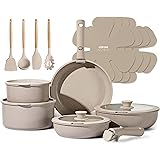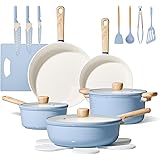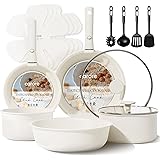Some suggestions to consider!
CAROTE 19pcs Pots and Pans Set Non Stick, Nonstick Cookware Set Detachable Handle, Induction Kitchen Cooking Sets with Removable Handle, RV Kitchen, Oven Safe, Taupe
$59.99 (as of February 26, 2026 10:31 GMT +00:00 - More infoProduct prices and availability are accurate as of the date/time indicated and are subject to change. Any price and availability information displayed on [relevant Amazon Site(s), as applicable] at the time of purchase will apply to the purchase of this product.)CAROTE 24pcs Ceramic Cookware Set, Pots and Pans Non Stick Kitchen Cookware Sets, Pots and Pans Set Cooking Set with Knife Set
$59.98 (as of February 26, 2026 10:31 GMT +00:00 - More infoProduct prices and availability are accurate as of the date/time indicated and are subject to change. Any price and availability information displayed on [relevant Amazon Site(s), as applicable] at the time of purchase will apply to the purchase of this product.)CAROTE 17pcs Pots and Pans Set, Nonstick Cookware Set Detachable Handle, Induction Kitchen Cookware Sets Non Stick with Removable Handle, RV Cookware Set, Oven Safe
$49.97 (as of February 26, 2026 10:31 GMT +00:00 - More infoProduct prices and availability are accurate as of the date/time indicated and are subject to change. Any price and availability information displayed on [relevant Amazon Site(s), as applicable] at the time of purchase will apply to the purchase of this product.)
Table of Contents
- 1. Choose the Right Cookware Materials
- 2. Invest in Quality Non-Stick Pans
- 3. Understand Proper Heat Settings
- 4. Maintain and Clean Your Cookware Properly
- 5. Use Appropriate Utensils
- 6. Proper Storage for Longevity
- 7. Master Basic Cooking Techniques
- 8. Experiment with Different Recipes
- 9. Safety First: Handling Hot Cookware
- 10. Keep Up with Latest Trends in Cookware
Starting your journey with cookware can feel overwhelming, but with the right guidance, even beginners can produce impressive results. If you’re looking for effective cookware tips for beginners to boost your cooking results in 2025, you’ve come to the right place. In this guide, Iâll share 10 proven tips that will help you navigate the world of cookware confidently and efficiently, ensuring every meal turns out delicious and perfectly cooked.
1. Choose the Right Cookware Materials
Understanding Different Materials
When selecting cookware, itâs essential to understand the different materials and their benefits. Stainless steel is durable and non-reactive, making it ideal for searing and sautéing. Cast iron offers excellent heat retention, perfect for frying and slow-cooking. Aluminum heats up quickly and distributes heat evenly, which is great for general use. Knowing the advantages of each material helps beginners make informed choices that suit their cooking style, especially in 2025, where eco-friendly and versatile options are trending.
For example, if you’re just starting out, a multi-purpose non-stick skillet (usually made of aluminum with a non-stick coating) can be very forgiving and easy to use. It allows you to cook with less oil and simplifies cleaning. As your skills grow, investing in different types of cookware allows you to expand your culinary repertoire.
In 2025, many brands are focusing on sustainable and innovative materials, such as eco-friendly non-stick coatings or ceramic alternatives that are safer and environmentally friendly. This shift is something beginners should consider when building their collection.
Matching cookware with your cooking needs
Beginners often make the mistake of buying a set of pans without considering specific cooking needs. For example, frying eggs requires a non-stick pan, while roasting vegetables may be better suited for roasting pans or sheet trays. Prioritizing versatile pieces, like a good sauté pan or Dutch oven, ensures you cover most cooking tasks without overcrowding your kitchen.
In 2025, compact and multi-functional cookware sets are increasingly popular, helping beginners organize their kitchens more efficiently. By choosing cookware that matches your lifestyle and cooking habits, youâre more likely to enjoy consistent results and stay motivated.
Remember, investing in the right materials from the beginning sets a strong foundation for your cooking journey.
2. Invest in Quality Non-Stick Pans
The benefits of high-quality non-stick cookware
For beginners, non-stick pans are a game-changer. They make cooking and cleaning much easier, especially for delicate foods like pancakes, eggs, or fish. Choosing a high-quality non-stick pan can prevent food from sticking and reduce the need for excess oil, aligning with health trends in 2025.
Quality non-stick coatings also last longer, even with frequent use, saving you money over time. Make sure to select pans that are PFOA-free and scratch-resistant to ensure safety and lasting performance. Tools like silicone spatulas are recommended for non-stick surfaces to prevent scratches that can compromise the coating’s integrity.
In 2025, advancements in non-stick technology include ceramic coatings that are environmentally friendly and more durable, making them ideal for beginners seeking reliable, safe cookware.
Proper care and maintenance of non-stick pans
Even the best non-stick pans require proper care to maintain their non-stick properties. Always hand wash them with a soft sponge and mild detergent; avoid abrasive scrubbers or metal utensils that can damage the coating. It’s also wise to avoid thermal shockâdonât put a hot pan into cold waterâthis can warp or damage the surface.
In 2025, many brands now offer lifetime warranties on their non-stick products, so following the care instructions not only extends their lifespan but also ensures you get the most value from your investment. Remember, a well-maintained pan improves results in every dish you make, reinforcing the importance of these cookware tips for beginners.
3. Understand Proper Heat Settings
The importance of heat management in cooking
One of the most common mistakes beginners make is cooking on the wrong heat level. Understanding how to control heat is fundamental to achieving perfect results. For example, high heat can quickly burn your food or warp non-stick coatings, while too low heat might lead to uneven cooking or undercooked meals.
In 2025, with smart cookware options featuring temperature indicators or adjustable handles, managing heat has become more intuitive. These innovations help beginners monitor and maintain consistent temperatures, enhancing their cooking results significantly.
My tip is to start with medium heat when following a new recipe. As you gain confidence, learn to adjust the heat according to the cooking stageâsautéing might require high heat initially, then lowering for simmering dishes.
Using heat wisely for different cooking techniques
For example, searing steak requires high heat to develop flavor quickly, while simmering soups benefits from low, gentle heat. Recognizing these nuances can make a big difference in your dishes’ outcomes. Practice and observation are key; experiment with your stove’s settings to find the ideal heat levels for various foods.
Investing in cookware with clear heat indicators or heat-resistant handles can help you prevent mistakes. Proper heat management not only produces better results but also extends the lifespan of your cookware by avoiding unnecessary stress or warping.
4. Maintain and Clean Your Cookware Properly
Cleaning techniques for different cookware types
Keeping your cookware clean is crucial for performance and longevity. For non-stick pans, gentle hand washing with soft sponges preserves the coating. Cast iron requires special care, including seasoning and avoiding soap to maintain its non-stick surface.
Stainless steel cookware can be cleaned with baking soda or vinegar for tough stains, and regular polishing keeps it shiny. Following manufacturer instructions and avoiding abrasive scrubbers for delicate surfaces ensures your cookware stays in top shape.
In 2025, eco-friendly cleaning products and innovative coatings mean that maintaining your cookware is easier and safer, helping you maintain optimal results in your kitchen.
Preventing damage and prolonging lifespan
Prevention is always better than repair. Use appropriate utensilsâwood, silicone, or plasticâto avoid scratching surfaces. Avoid stacking heavy items directly on non-stick or delicate cookware to prevent chips or warping.
Regularly inspecting your pots and pans for damage and repairing minor issues promptly can significantly extend their lifespan. Remember, well-maintained cookware delivers consistent results and minimizes waste, essential tips for beginners aiming for success in 2025.
5. Use Appropriate Utensils
Choosing utensils that protect your cookware
Using the right utensils is essential for preserving your cookware‘s condition. For non-stick surfaces, silicone, wood, or plastic utensils are the best choicesâthey wonât scratch or damage the coating. Metal utensils should generally be avoided unless specified as safe by the manufacturer.
In 2025, many brands now produce utensils designed specifically to be gentle on cookware surfaces, making it easier for beginners to avoid accidental damage. Investing in a basic set of silicone spatulas, wooden spoons, and nylon utensils can dramatically improve your results and prevent costly replacements.
Remember, using the appropriate utensils helps maintain your cookwareâs non-stick and structural integrity over time, improving overall results in your cooking endeavors.
Supporting effective cooking techniques
Proper utensil selection also aids in executing specific cooking techniques. For instance, stir-frying requires quick, gentle movements with non-abrasive tools to prevent damage and ensure even heat distribution. Similarly, flipping pancakes or turning delicate fish is best done with soft, lightweight utensils.
By choosing utensils thoughtfully, you reduce the risk of mishaps and improve your overall cooking experience. This pairing of tools and techniques is a simple but powerful cookware tip for beginners seeking consistent, professional-looking results in 2025.
6. Proper Storage for Longevity
7. Master Basic Cooking Techniques
8. Experiment with Different Recipes
9. Safety First: Handling Hot Cookware
10. Keep Up with Latest Trends in Cookware
Frequently Asked Questions
- What are the most essential cookware tips for beginners in 2025?
- Focus on choosing the right materials, mastering heat control, maintaining your cookware, and using proper utensils.
- How do I care for non-stick cookware?
- Hand wash with soft sponges, avoid metal utensils, and prevent sudden temperature changes to prolong its life and maintain non-stick properties.
- Can I cook healthy meals with the right cookware tips for beginners?
- Absolutely! Using non-stick pans with less oil and choosing eco-friendly cookware options in 2025 supports a healthier diet.
- What are some cookware trends to watch in 2025?
- Smart cookware with temperature controls, eco-friendly non-stick coatings, and space-saving multi-functional sets are popular trends.
Conclusion
In 2025, mastering effective cookware tips for beginners is the key to elevating your cooking results. Whether itâs selecting the right materials, managing heat, or caring for your pots and pans, these tips lay the foundation for culinary success. Embrace these best practices, stay curious, and explore new recipesâyour kitchen adventures will flourish. Remember, the right cookware and proper techniques can turn even novice cooks into confident chefs in no time!



